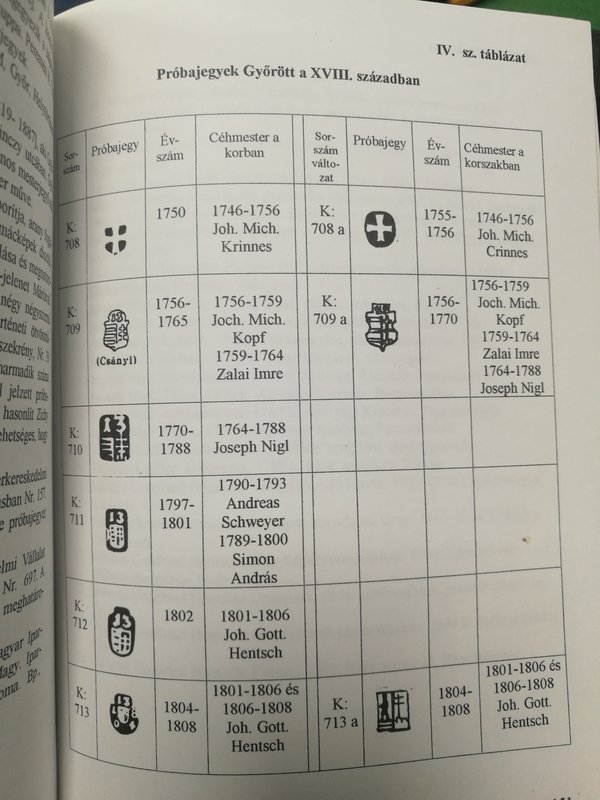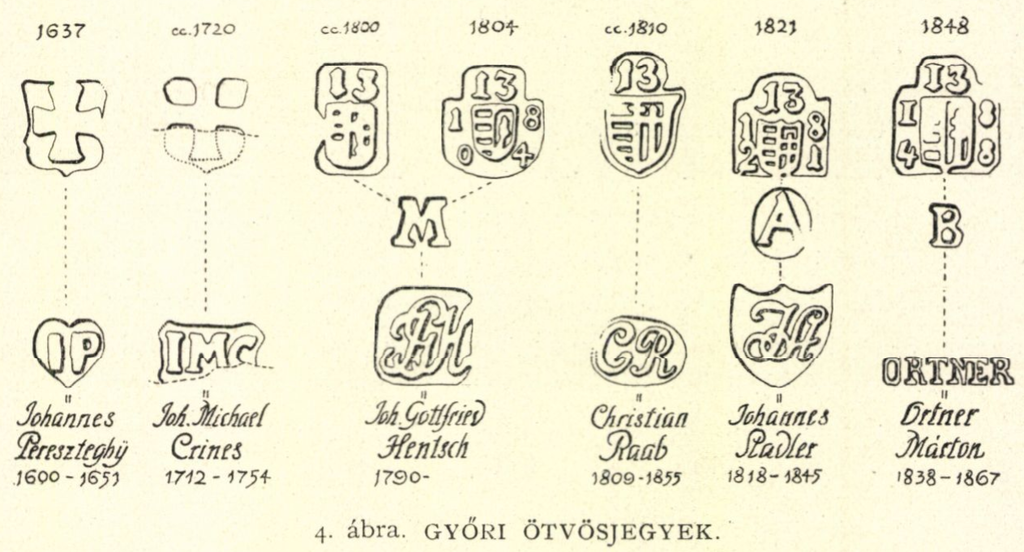AG2012 wrote:Hi,
Vague similarity to Raab cross is not enough to attribute this particular item to a small town in Hungary, and being in the pristine condition after 300 years across the continent.
It would be really unprofessional to do so, and most of us here stopped believing in miracles long time ago.
Regards
Large serving tray/pot with lid (and possibly hot water bassin), 18thC Hungarian?
Re: Large serving tray/pot with lid (and possibly hot water bassin), 18thC Hungarian?
That is why I've asked for examples, in my previous post. :)
Re: Large serving tray/pot with lid (and possibly hot water bassin), 18thC Hungarian?
@Mmollari
Come on now, it was a general statement and directed to you.
Come on now, it was a general statement and directed to you.
Re: Large serving tray/pot with lid (and possibly hot water bassin), 18thC Hungarian?
One last comment, and then I'll wait and see what people think.
Something bothered me earlier when someone mentioned that the finial looked like an acorn. I agree that it is slightly similar, but I would argue that it looks more like the flower bud of a thistle, or other flower bud. I do not know if that has been used much in silver anywhere, but that is what I see when I look at it.
Something bothered me earlier when someone mentioned that the finial looked like an acorn. I agree that it is slightly similar, but I would argue that it looks more like the flower bud of a thistle, or other flower bud. I do not know if that has been used much in silver anywhere, but that is what I see when I look at it.
Re: Large serving tray/pot with lid (and possibly hot water bassin), 18thC Hungarian?
Sorry, I just read it that way. I apologize.
Qrt.S wrote:@Mmollari
Come on now, it was a general statement and directed to you.
Re: Large serving tray/pot with lid (and possibly hot water bassin), 18thC Hungarian?
It might not be an acorn now that I look at it, it could be a vegetable like asparagus, like the flowering tip of an asparagus or similar vegetable, so maybe this was intended to be a vegetable dish. ::: Looking at the way that part is attached, I wonder if that could help to date the piece. :::
Re: Large serving tray/pot with lid (and possibly hot water bassin), 18thC Hungarian?
Here are the known 18. century marks from Győr.MMollari wrote:I just wonder where you got the impression that I thought it was the whole truth? If I thought that, there would be no reason to post here, right?
Now that we've got that out of the way, I would still like to see what the Hungarian marks look like BEFORE 1750, because as much as I've looked around, I've had absolutely no luck finding any examples (and this still does not imply that I think it is Hungarian or from before 1750, but I am curious).
Qrt.S wrote:It is interesting that exactly with the same number 1931 (page 225) and outlook the information is found in Jan Divis' book: Guide to Silver Marks of the World, published 1998. This is again a typical example of how the vast majority of silver books are copied copies of copied copies of copied copies....none is checked, everything is swallowed with correct or incorrect information, spread widely and suddenly it becomes the whole truth but based on nothing!
"It must be the truth because it is mentioned in so many books" AAARRRGHHHH!
FYI
Divis' book contains quite a lot of questionable information.

You can see,, there are some similarities, but the difference is significant
I checked the list of known makers, and I didn't find maker with RH monogram. (source: N. Mészáros Júlia:Győri ötvösség 1700-1800; Győr, 2001))
As I see, the style is not a typical middle European baroque item.
Best regards!
Krisztián
Re: Large serving tray/pot with lid (and possibly hot water bassin), 18thC Hungarian?
Thank you, Krisztián! I appreciated that you took the time to take a picture from the book and add it here.
The first one (K:708) does look a lot like the one on my entrée dish/vegetable dish, but the "4 dots" make a much thinner cross than the one indicated in the book.
The first one (K:708) does look a lot like the one on my entrée dish/vegetable dish, but the "4 dots" make a much thinner cross than the one indicated in the book.
huszas76 wrote:Here are the known 18. century marks from Győr.
You can see,, there are some similarities, but the difference is significant
I checked the list of known makers, and I didn't find maker with RH monogram. (source: N. Mészáros Júlia:Győri ötvösség 1700-1800; Győr, 2001))
As I see, the style is not a typical middle European baroque item.
Best regards!
Krisztián
Re: Large serving tray/pot with lid (and possibly hot water bassin), 18thC Hungarian?
That is certainly a possibility and I think you're right on the money about it being an entrée/vegetable dish.
It would certainly be nice to at least get an idea about age. I think it has a lot of symmetry in the design, that would fit with baroque / regency, but given that I have close to zero hands-on experience with items of this size (and from that period), it is a cautious guess.
It would certainly be nice to at least get an idea about age. I think it has a lot of symmetry in the design, that would fit with baroque / regency, but given that I have close to zero hands-on experience with items of this size (and from that period), it is a cautious guess.
Aguest wrote:It might not be an acorn now that I look at it, it could be a vegetable like asparagus, like the flowering tip of an asparagus or similar vegetable, so maybe this was intended to be a vegetable dish. ::: Looking at the way that part is attached, I wonder if that could help to date the piece. :::
Re: Large serving tray/pot with lid (and possibly hot water bassin), 18thC Hungarian?
Vegetable Tureen with artichoke on top, I have no idea why I couldn't remember the word "Artichoke", it's definitely an artichoke not an asparagus. :::
I have seen these vegetable tureens with artichokes on top before, they are mid-19th century French or Belgium, so now I'm wondering if it is from the time when Belgium did not have compulsory hallmarks (1873-1942 or something like that?) :::: If someone knows of a Belgian silversmith that matches the initials, maybe we can solve the mystery. ::::
I have seen these vegetable tureens with artichokes on top before, they are mid-19th century French or Belgium, so now I'm wondering if it is from the time when Belgium did not have compulsory hallmarks (1873-1942 or something like that?) :::: If someone knows of a Belgian silversmith that matches the initials, maybe we can solve the mystery. ::::
Re: Large serving tray/pot with lid (and possibly hot water bassin), 18thC Hungarian?
It would be interesting and useful to determine exact composition of the alloy.
Fortunately, there are electronic testers now.
Why is alloy composition important ?
1.Silver contents can be compared with standards used in various countries and narrow the search.
2.Old silver alloys are well known to have several trace metals (e.g. gold) beside copper being the principal alloying metal. Those ``impurities`` in old silver are the result of imperfect metallurgical methods at the time.
Two more references for Győr (Raab) mark; it is really a distinctive cross.

Győr (Raab) is above letter e.

Regards
Fortunately, there are electronic testers now.
Why is alloy composition important ?
1.Silver contents can be compared with standards used in various countries and narrow the search.
2.Old silver alloys are well known to have several trace metals (e.g. gold) beside copper being the principal alloying metal. Those ``impurities`` in old silver are the result of imperfect metallurgical methods at the time.
Two more references for Győr (Raab) mark; it is really a distinctive cross.

Győr (Raab) is above letter e.

Regards
Re: Large serving tray/pot with lid (and possibly hot water bassin), 18thC Hungarian?
I would love to know the composition too, unfortunately I don't know anyone who has a handheld XRF, which is probably what is required to test this without damaging it? The guys in Copenhagen I normally sell scrap to have one of the XRF chamber models, but it is not big enough to fit this, sadly.
AG2012 wrote:It would be interesting and useful to determine exact composition of the alloy.
Fortunately, there are electronic testers now.
Why is alloy composition important ?
1.Silver contents can be compared with standards used in various countries and narrow the search.
2.Old silver alloys are well known to have several trace metals (e.g. gold) beside copper being the principal alloying metal. Those ``impurities`` in old silver are the result of imperfect metallurgical methods at the time.
Two more references for Győr (Raab) mark; it is really a distinctive cross.
Győr (Raab) is above letter e.
Regards
Re: Large serving tray/pot with lid (and possibly hot water bassin), 18thC Hungarian?
I just wanted to make sure every Danish Provincial silversmith working around 1830-1850 was checked. ::: I've had Danish Provincial spoons from this period of time which only bore a maker's mark. :::
Re: Large serving tray/pot with lid (and possibly hot water bassin), 18thC Hungarian?
I have Chr. A. Bøje's 3-volume revised set of Danish silversmiths, and sadly it is not in there. :(
I'm sorry for not replying sooner, I still haven't had any luck solving this mystery.
I'm sorry for not replying sooner, I still haven't had any luck solving this mystery.
Aguest wrote:I just wanted to make sure every Danish Provincial silversmith working around 1830-1850 was checked. ::: I've had Danish Provincial spoons from this period of time which only bore a maker's mark. :::